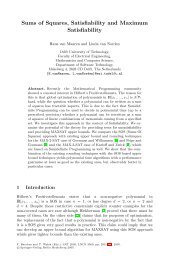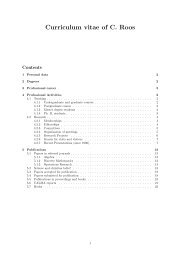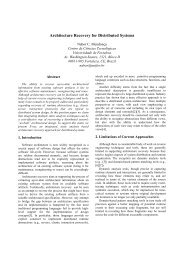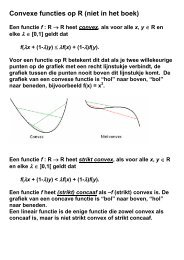Full-Newton step polynomial-time methods for LO based on locally ...
Full-Newton step polynomial-time methods for LO based on locally ...
Full-Newton step polynomial-time methods for LO based on locally ...
Create successful ePaper yourself
Turn your PDF publications into a flip-book with our unique Google optimized e-Paper software.
Analysis of the algorithm (1)Note that ψ(t) is m<strong>on</strong>ot<strong>on</strong>ically decreasing <str<strong>on</strong>g>for</str<strong>on</strong>g> t ≤ 1 and m<strong>on</strong>ot<strong>on</strong>ically increasing <str<strong>on</strong>g>for</str<strong>on</strong>g> t ≥ 1.In the sequel we denote by ̺ : [0, ∞) → [1, ∞) the inverse functi<strong>on</strong> of ψ(t) <str<strong>on</strong>g>for</str<strong>on</strong>g> t ≥ 1 andby χ : [0, ∞) → (0,1] the inverse functi<strong>on</strong> of ψ(t) <str<strong>on</strong>g>for</str<strong>on</strong>g> 0 < t ≤ 1. So we haveand̺(s) = t ⇔ s = ψ(t), s ≥ 0, t ≥ 1. (17)χ(s) = t ⇔ s = ψ(t), s ≥ 0, 0 < t ≤ 1. (18)Note that χ(s) is m<strong>on</strong>ot<strong>on</strong>ically decreasing and ̺(s) is m<strong>on</strong>ot<strong>on</strong>ically increasing in s ≥ 0.Lemma 8 Let t > 0 and ψ(t) ≤ s. Then χ(s) ≤ t ≤ ̺(s) .Proof: This is almost obvious. Since ψ(t) is strictly c<strong>on</strong>vex and minimal at t = 1, withψ(1) = 0, ψ(t) ≤ s implies that t bel<strong>on</strong>gs to a closed interval whose extremal points areχ(s) and ̺(s).•35
















